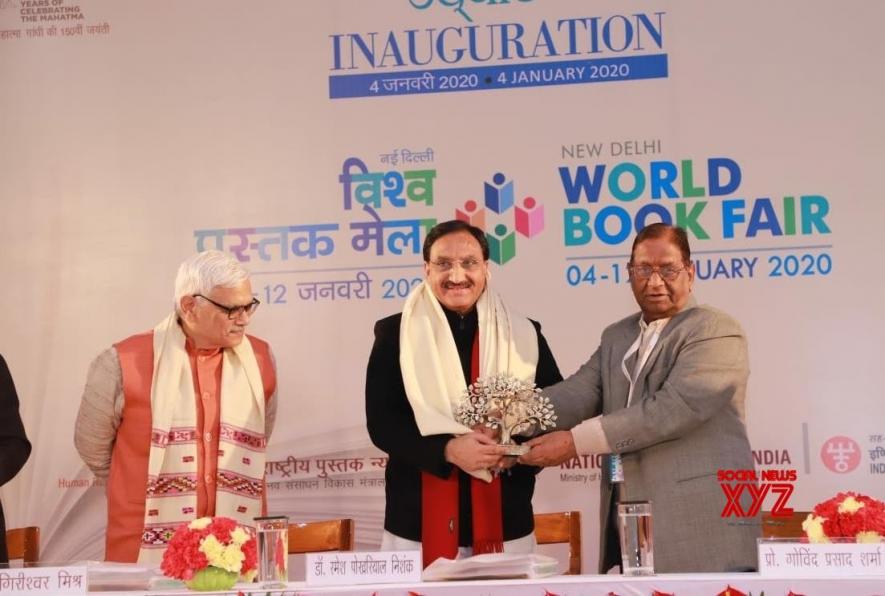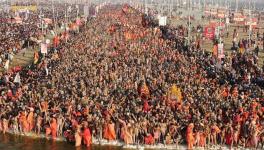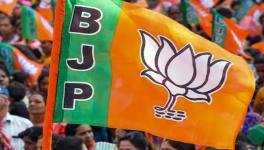World Book Fair 2020: Selling Hate, Superstition and Untruth

Perhaps it just as well that the interest of readers and lovers of literature in the World Book Fair in Delhi has declined. In this year’s edition of the fair, not only have a number of neighbouring nations been excluded from participation due to political considerations, an entire hall at, appropriately named ‘Nakshatra 2020’ has been set up to promote superstitions and irrationality among India’s citizens.
‘Experts’ are selling prophecies at the Nakshatra stall. They can be seen, sitting around, peering into people’s hands and doling out predictions and prescriptions of trinkets and gemstones. The scientific-minded would be dismayed by how the idea of controlling the effects of “harmful” planets and constellations is drawing large crowds to this hall.
What is worse, at World Book Fair 2020, religious fanatics have been threatening other publishers. Though the managers of the event simply deny this is happening, Sunny, an activist with a progressive publication, says, “Last year and this time too saffron-minded people are arguing and fighting with us for no reason whatsoever. They claim that our books are ‘hurting their feelings’ and so we should leave. They accuse us of tarnishing freedom fighter Bhagat Singh’s image and demand that we remove his famous work, Why I am an Atheist, from our stall. We complained about this to the managers, but they ignored us.”
Sunny says that saffron-clad holy men keep on chanting aloud at the various stalls and pavilions, but if a progressive organisation sings an inqilabi (revolutionary) song even outside the halls to draw visitors and spread progressive messages of writers past and present, then the managers of the fair raise objections. Last year, some Hindutva organisations had infamously tried to sabotage a stall displaying Islamic texts. This time, a quarrel between two religious book stalls was somehow averted.
The World Book Fair has been organised in Delhi since 1972, making the ongoing fair its 28th episode. It is organised every year at Pragati Maidan by the National Book Trust (NBT), a government body. This time, readers will be pleased to know, the theme of the fair is “Mahatma Gandhi: Writer of Writers”. Around 600 domestic and foreign publishers are participating in the event, which closes on January 12. Even the colour of identity cards hanging around the necks of National Book Trust (NBT) officials has turned saffron this year, but the managers are playing blind and deaf to the changing nature of this event.
Anyhow, since Gandhi is the theme, there are attempts to paint the Mahatma in saffron as well. On January 9, while speaking at a seminar on Gandhi’s ideology at the theme pavilion, one Hindutvadi ‘thinker’ repeatedly emphasised that Gandhi considered cow protection more important than Swaraj and that he had favoured forming an organisation for cow protection.
Pankaj Chaturvedi, senior officer of the NBT and the editor-in-chief of the Hindi section of the fair, refutes all these happenings and changes. He says that publishers of all kinds have been given a place. Construction work is going on, due to which there is not as much open space as before, which may annoy some publishers, he adds.
Yet, sample these excerpts and titles that the NBT has chosen to permit at the fair: “Hindu unity is needed today. The clouds of a crisis are hovering over Hindus. If we had stopped Muslims from buying land in our areas we would not have seen such days. We should protect our girls from Muslims. They should not love any Muslim boy. From the very beginning, we should incite hatred towards Muslims so that our girls can avoid becoming victims of ‘love jihad’.”
These hate-filled words are not emanating from some fundamentalist organisation but from a stall that the Sanatan Sanstha has set up at the fair, with the permission of NBT.
The workers at this stall are spreading hate and propaganda while selling literature filled with Hindu nationalism and anti-Muslim propaganda. Not just books, they are selling cow urine, cow dung-based incense sticks, soaps, oils, lockets, camphor and so on. All of these are being pushed as a route to spiritual purification.
But, this time, book lovers are less enthusiastic about visiting the fair. Those who love reading believe that the fair is getting shrouded in an ever-darkening shade of saffron. They see more and more monks and holy men gathering in the venue, ostensibly to promote books. They find a growing dominance of religious and superstitious books. Book publishers who deal in analytical texts and want to promote respect for differences of opinion are less visible at the World Book Fair this time. In turn, readers have also decided, for the most part, to stay away.
Small publishers also complain that the managers of the book fair have raised the fees for setting up book stalls, which makes participation unprofitable for them. Books with progressive themes that encourage scientific thinking are, therefore, less visible at the fair. Last year, even well-known publishers such as ‘Filhaal’ and ‘Samayantar’ could not set up stalls. This time, even more publishers, including ‘Mass Media’ and ‘People’s Media’ have stayed away.
The fees for small publishers has been increased from Rs 6,000 to Rs 15,000. Book stall fees for Hindi and regional languages has been increased to Rs 45,000 and English stall fees to Rs 65,000. In such circumstances, conservative and wealthy publishing outfits have come to dominate the fair. But the managers deny this: “There is no discrimination against small publishers,” Chaturvedi says.
On the changed nature of the World Book Fair, well-known media analyst Anil Chamadia says that the aim of the NBT is to benefit big publishers rather than protect the interests of smaller imprints. Most of the Indian-language halls predominantly feature books in Hindi while other regional languages are conspicuous by their absence. In Hindi literature too, conservative and religious literature prevail over all others.
Chamadia raises another important point: a few years ago, there used to be spirited political discussions at the fair, which are now missing. For example, he cites the violence perpetrated by masked goons at Delhi’s Jawaharlal Nehru University. The episode took place just a day after World Book Fair 2020 was inaugurated but it is not even being murmured about at any of the venues. “The walls of the book fair have been made so strong that no outside voice or howl can be heard inside,” he says. “Therefore, it is useless to expect that this fair will create any political consciousness.”
Journalist Abhishek Srivastava, who attended the fair, says, “The number of readers at the fair has decreased and the number of consumers has increased. Consumers have been replaced by readers. People are coming here to buy products instead of buying books. That is why someone is buying a book to improve their child’s English and someone is buying a book or powder to reduce belly fat.”
For all these reasons, literature that promotes consumerism has increased in popularity while the demand for fiction, non-fiction and book dealing with life values has decreased. “The colour of the fair has changed a lot since the last five years. Now there are no meaningful debates held here, as there once used to be,” Srivastava says.
On the growing trend of Right-wing literature at the fair, senior journalist Anand Swaroop Verma alleges that the direct reason for this is that the government which is in power is Hindutva-thinking, and it is dyeing all government institutions in its colour.
The conversation with the director of the fair, Neera Jain, was quite interesting in this respect: At first, she denied that the fair had been painted saffron. Then she blamed the media for creating the impression that it was being overtaken by hard-core Hindutva publishers. Finally, when asked what books she had bought at the fair, she said: “Biography of Yogi Adityanath”!
Shiv Inder Singh is an independent journalist. The views are personal.
Get the latest reports & analysis with people's perspective on Protests, movements & deep analytical videos, discussions of the current affairs in your Telegram app. Subscribe to NewsClick's Telegram channel & get Real-Time updates on stories, as they get published on our website.
























